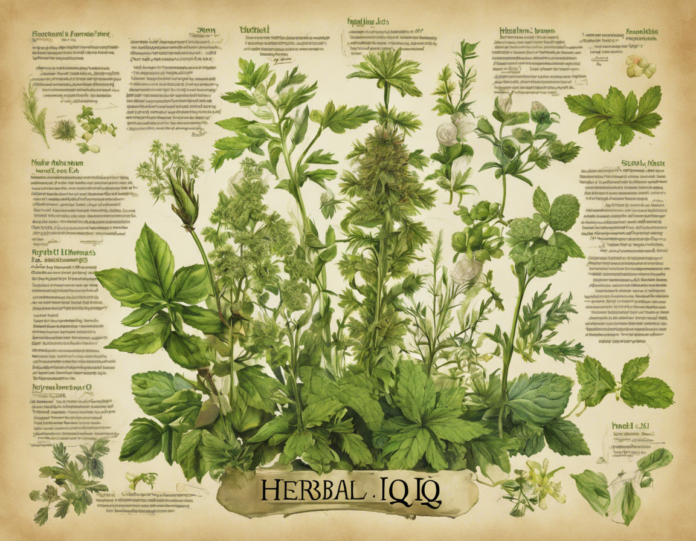As we navigate through an era marked by rapid technological advancements, there has been a noticeable shift towards adopting more natural and holistic approaches to health and wellness. One area where this trend is particularly evident is in the use of herbal remedies.
Herbs have been used for centuries across various cultures for their medicinal properties. From relieving minor ailments to boosting overall well-being, herbs offer a wealth of benefits that are increasingly being validated by scientific research. In this article, we will delve into the concept of Herbal IQ – the intelligent use of herbs to support various aspects of health.
Understanding Herbal IQ
Herbal IQ refers to the knowledge, wisdom, and expertise one possesses in utilizing herbs for their health-enhancing properties. It involves not just knowing about different herbs and their effects but also understanding how to effectively incorporate them into daily routines for maximum benefits.
Developing your Herbal IQ requires a combination of education, experience, and experimentation. It involves learning about the various herbs, their properties, potential interactions, and safe dosages. With this knowledge, individuals can make informed decisions about which herbs to use for specific purposes and how to use them in a way that maximizes their efficacy.
The Power of Natural Intelligence
The concept of Natural Intelligence encompasses the idea of utilizing the inherent wisdom found in nature for our well-being. When it comes to herbs, this means tapping into the healing capabilities of plants that have evolved over centuries. Unlike synthetic compounds, which often come with side effects and long-term risks, herbs offer a more gentle and holistic approach to health.
Herbs contain a myriad of bioactive compounds that work synergistically to produce therapeutic effects. From anti-inflammatory and antioxidant properties to immune-boosting and adaptogenic qualities, herbs offer a wide range of benefits that can support various systems in the body. When used intelligently and in conjunction with a healthy lifestyle, herbs can be powerful allies in promoting overall health and vitality.
Building Your Herbal IQ
1. Education:
- Start by learning about different herbs and their uses. There are numerous resources available, including books, online courses, and workshops.
- Understand the principles of herbal medicine, including dosage, contraindications, and potential interactions.
- Consult with herbalists or naturopathic doctors to deepen your knowledge and receive personalized guidance.
2. Experimentation:
- Start small by incorporating one or two herbs into your routine.
- Observe how your body responds and adjust dosages as needed.
- Keep a journal to track your experience with different herbs and formulations.
3. Integration:
- Incorporate herbs into your daily rituals, such as adding them to teas, smoothies, or meals.
- Explore different delivery methods, such as tinctures, capsules, or topical applications.
- Combine herbs synergistically for enhanced effects, following guidance from experienced herbalists.
Herbal IQ in Practice
To illustrate how Herbal IQ can be applied in practice, let’s consider a few common scenarios:
1. Stress and Anxiety:
- Herbs like Ashwagandha and Lemon Balm have adaptogenic and calming properties that can help manage stress.
- Using these herbs in teas or tinctures can support a sense of calm and relaxation during stressful periods.
2. Digestive Health:
- Ginger and Peppermint are digestive aids that can help alleviate symptoms like bloating and indigestion.
- Incorporating these herbs into meals or as teas after eating can promote healthy digestion.
3. Immune Support:
- Echinacea and Elderberry are immune-boosting herbs that can help ward off infections.
- Taking these herbs preventatively during cold and flu season can strengthen the immune system.
By tailoring herb usage to specific needs and understanding how different herbs interact with the body, individuals can harness the power of Herbal IQ to enhance their health naturally.
Frequently Asked Questions (FAQs)
Q1: Are herbs safe to use?
A1: When used appropriately and in moderation, most herbs are safe for consumption. It is important to research each herb thoroughly and consult with a healthcare provider before incorporating new herbs, especially if you are pregnant, nursing, or have underlying health conditions.
Q2: How do I know which herbs to use for a specific health concern?
A2: Researching the properties of different herbs and consulting with herbalists or healthcare providers can help you identify the best herbs for your specific needs. It is important to consider factors such as dosage, potential interactions, and contraindications.
Q3: Can herbs be used in conjunction with medications?
A3: Some herbs may interact with medications, either enhancing or inhibiting their effects. It is crucial to consult with a healthcare provider before combining herbs with any prescription medications to ensure there are no adverse reactions.
Q4: How long does it take to experience the benefits of using herbs?
A4: The timeline for experiencing the benefits of herbs can vary depending on the individual, the herb used, dosage, and frequency of use. While some herbs may offer immediate relief, others may require consistent use over time to see noticeable effects.
Q5: Can I grow my own herbs for medicinal purposes?
A5: Yes, many herbs can be grown at home either indoors or outdoors, depending on the climate and space available. Growing your own herbs can ensure a fresh and sustainable supply for medicinal use, but proper care and harvesting techniques are essential.
Conclusion
In conclusion, developing your Herbal IQ is an empowering journey towards harnessing the natural intelligence of herbs for health and well-being. By educating yourself, experimenting with different herbs, and integrating them into your daily routine mindfully, you can unlock the powerful benefits that herbs offer. Remember to approach herb usage with respect, knowledge, and caution to ensure a safe and effective experience. Start small, stay curious, and let the wisdom of herbs guide you on your path to optimal health.












